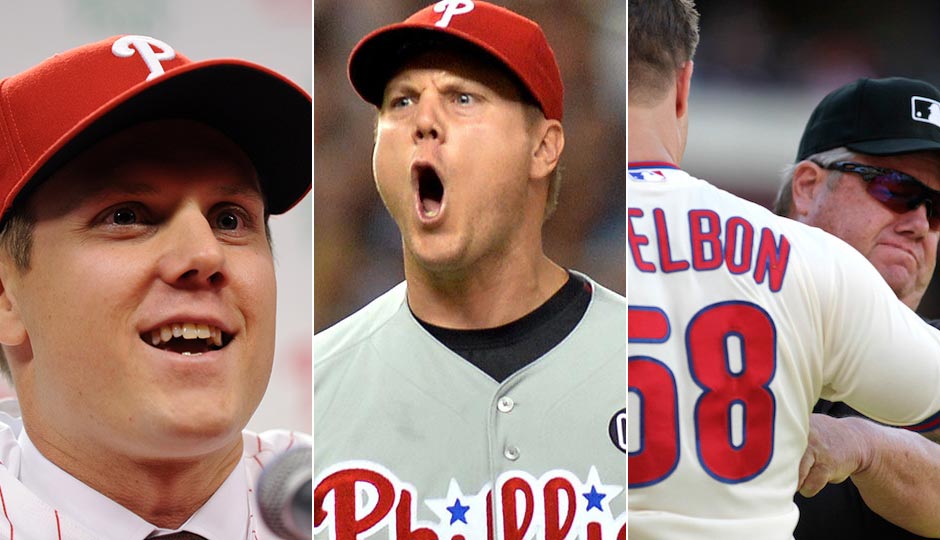Jonathan Papelbon Just Had the Weirdest Phillies Career Ever

Papelbon through the years. Photos, from left, Howard Smith, Steve Mitchell, H. Rumph Jr., all USA Today Sports Images
When a sports team, whether in Philadelphia or elsewhere, makes a high-profile acquisition and it fails, it’s usually for one of a few common reasons. Maybe the player arrives on his new team and is obviously past his prime. Maybe he was never that good to begin with and the team misjudged him. Maybe he gets injured and is never the same again. Maybe there’s a PED bust, a scandal, an arrest or some other embarrassing off-the-field incident. Maybe he just can’t hack it in his new city.
Jonathan Papelbon’s tenure with the Phillies, which came to an end Tuesday when he was traded to the Washington Nationals, was unique in that it looks absolutely nothing like any other failed signing in the history of Philadelphia sports.
Papelbon wasn’t terrible — in fact, he was consistently one of baseball’s best relief pitchers for the last four years, and in the process became the Phillies’ all-time saves leader. He was healthy for his entire tenure on the team. There were no arrests or off-field scandals, nor did Papelbon’s name ever surface in any drug probe. There’s no indication that he ever gave less than his all on the field. It’s not that he couldn’t handle the pressure cooker of Philadelphia — he had his greatest career success in the similarly tough fan and media environment of Boston. And Papelbon’s numbers in his Philadelphia career were comparable to his time with the Red Sox, including a lower ERA and a higher strikeout-to-walk ratio.
Yet Papelbon will likely go down in Phillies history as a catastrophic failure, one synonymous with the Phillies’ decline from elite team to laughingstock. The Inquirer’s Bob Ford the other day even called his signing the Phillies’ biggest mistake of the past few years.
However, I think it’s obvious that Papelbon, in the last few years, was one of the team’s few bright spots. And history, and hindsight, is likely to view him more favorably.
Why do Phillies fans dislike Papelbon? Start with that four-year, $50 million contract, by far the largest ever given to a relief pitcher, pitched at the time as an elite team going after an elite player. “He is among the elite closers in the game and someone who clearly has a passion to win,” general manager Ruben Amaro said when the deal was announced in November of 2011. Yet things didn’t go as promised- throughout Papelbon’s tenure, there was a lot of passion, but not so much winning.
The pitcher quickly earned bad press and fan attention due to his attitude, his frequent trashing of the organization and outspokenness about wanting to be traded. His entire tenure in Philadelphia coincided with a particularly bad time in team history and yes, there was the time he made an obscene gesture to the fans (and drew a seven-game suspension), after blowing a save at home in September of 2014. Papelbon didn’t have many blown saves — and had none in 2015 — but the ones he did blow tended to be memorably painful.
I won’t defend the crotch-grabbing incident, which many will view as the iconic moment of Papelbon as a Phillie. But if you think about it, wasn’t everything Papelbon said about the organization true? Don’t fans regularly, and rightly, trash the Phils’ management, in much the same terms? If you were him, wouldn’t you have wanted to be traded, too?
And say what you will about the many factors behind the Phils’ sad decline, but you can’t blame Papelbon for it — in fact, he’s been one of their only consistently above-average players in the last four years. Remember — Papelbon was signed as an alternative to Ryan Madson after the 2011 season, and Madson ended up missing the next three seasons due to injuries. Had the Phils signed Madson instead, the last four years would likely have been even worse.
Papelbon’s tenure correlated with the Phillies’ long decline, but did not in any way cause it. Instead, the team’s struggles in every other facet of the game meant that his talents as an elite closer were completely useless to them. And because the sabermetrically allergic Phillies, in 2011, were alone among major league teams in believing that a closer was worth a $50 million contract, that contract soon became untradeable, at least until it was close to expiration. The other “great untradeable,” Ryan Howard, was sort of the inverse — his attitude was never a problem, but his declining play certainly was.
Was Papelbon’s contract a mistake? Yes. The biggest the team made in the Amaro years? Not even close. It has to fall far behind the Howard contract, along with the first Cliff Lee trade, the second Hunter Pence trade and the decision to put off rebuilding until years too late.
But this isn’t to say Papelbon won’t be entirely missed. However long the Phillies’ rebuilding project takes, they’re going to succeed again eventually. And whenever they do, there’s a good chance they won’t end up with a closer as good as Jonathan Papelbon.
Follow @stephensilver on Twitter.


